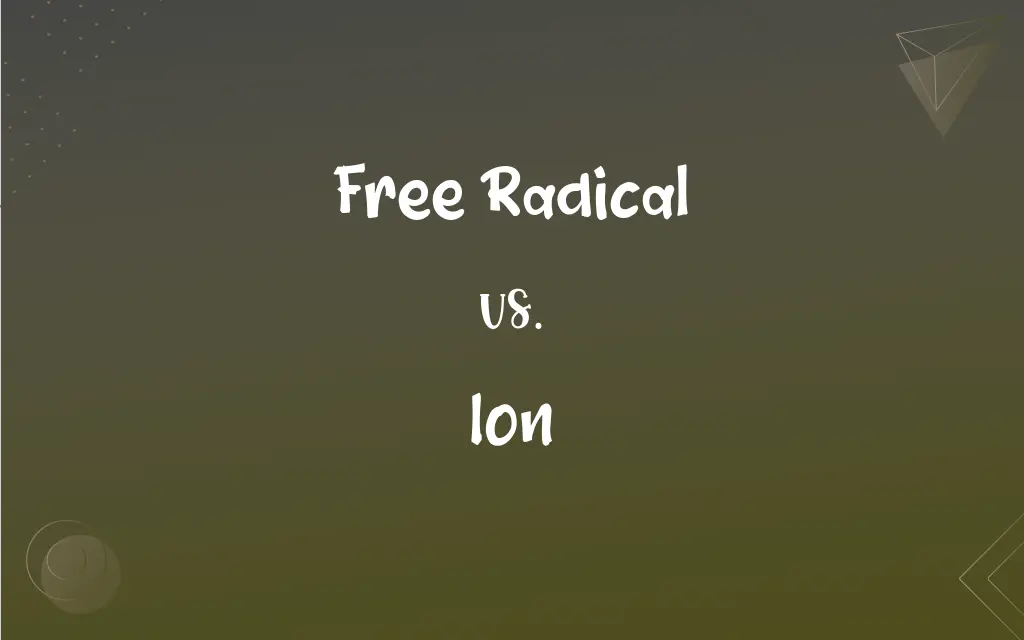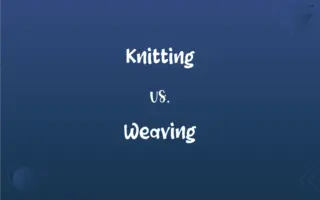Free Radical vs. Ion: What's the Difference?
Edited by Harlon Moss || By Janet White || Published on December 16, 2023
Free radicals are atoms or molecules with unpaired electrons, highly reactive; ions are atoms or molecules with a net electric charge due to loss or gain of electrons.

Key Differences
Free radicals are chemical species with one or more unpaired electrons, making them highly reactive and unstable. Ions, in contrast, are atoms or molecules that have gained or lost electrons, resulting in a net positive or negative charge.
The reactivity of free radicals stems from their unpaired electrons seeking stability, often leading to chain reactions. Ions, however, primarily engage in ionic bonding due to their charge, contributing to the formation of ionic compounds.
In biological systems, free radicals can cause cellular damage but also play vital roles in signaling. Ions are crucial in biological processes, such as nerve impulse transmission and muscle contraction.
Free radicals are often generated by external factors like radiation or heat. Ions are formed by the loss or gain of electrons, influenced by chemical reactions.
In environmental chemistry, free radicals are significant in processes like atmospheric reactions. Ions, conversely, are key components in environmental phenomena such as soil chemistry and water salinity.
ADVERTISEMENT
Comparison Chart
Electron Configuration
Unpaired electrons
Complete loss or gain of electrons
Reactivity
Highly reactive due to unpaired electrons
Reactivity based on charge
Formation
Often formed by external factors like heat
Formed by electron transfer in reactions
Role in Biological Systems
Can cause damage but also important in signaling
Essential in nerve transmission, muscle function
Environmental Impact
Involved in atmospheric chemistry
Affects soil and water chemistry
ADVERTISEMENT
Free Radical and Ion Definitions
Free Radical
A product of molecular fragmentation.
UV radiation can break down ozone, forming free radicals.
Ion
A charged species formed by electron loss or gain.
Chloride ions maintain the body's fluid balance.
Free Radical
A molecule with an unpaired electron.
The hydroxyl free radical is highly reactive with organic compounds.
Ion
A carrier of electricity in solutions.
Ions in battery electrolytes facilitate the flow of current.
Free Radical
A participant in chain reactions due to its reactivity.
Free radicals propagate chain reactions in polymerization.
Ion
An atom or molecule with a net electric charge.
Sodium ions are essential for nerve impulse conduction.
Free Radical
A factor in oxidative stress and damage in cells.
Antioxidants neutralize free radicals to prevent cellular damage.
Ion
A role player in biochemical processes.
Calcium ions are crucial for muscle contractions.
Free Radical
An unstable, highly reactive species in chemical reactions.
Free radicals contribute to the aging process through oxidative stress.
Ion
A constituent of ionic compounds.
In table salt, sodium and chloride ions are bonded ionically.
Ion
An atom or a group of atoms that has acquired a net electric charge by gaining or losing one or more electrons.
Ion
An atom or group of atoms bearing an electrical charge, such as the sodium and chlorine atoms in a salt solution.
FAQs
What makes free radicals reactive?
Their unpaired electrons.
How are ions formed?
By the gain or loss of electrons.
Are free radicals always harmful?
Not always, they have roles in signaling and other processes.
Can ions participate in covalent bonding?
No, they primarily engage in ionic bonding.
Do free radicals play a role in aging?
Yes, through oxidative stress.
Do free radicals occur naturally in the body?
Yes, in various metabolic processes.
What is the role of ions in nerves?
They transmit nerve impulses.
Can antioxidants neutralize free radicals?
Yes, they can donate electrons to stabilize them.
How do ions affect water chemistry?
They influence properties like salinity and conductivity.
Are all ions positively charged?
No, they can be either positively or negatively charged.
Can ions exist independently in nature?
Yes, especially in salts and solutions.
Can ions be part of a gas?
Rarely, they are more common in solids and liquids.
Are free radicals always molecules?
They can be atoms or molecules.
Can free radicals be beneficial?
Yes, in controlled amounts for cellular signaling.
Are ions involved in chemical bonding?
Yes, primarily in ionic bonds.
Do ions have a role in muscle function?
Yes, especially in contraction and relaxation.
Can free radicals form from environmental exposure?
Yes, from factors like radiation or pollutants.
Do free radicals contribute to disease?
They can, particularly in chronic diseases.
Is the body's defense against free radicals important?
Yes, to prevent oxidative damage.
Do ions help in maintaining pH balance?
Yes, they are crucial in buffering systems.
About Author
Written by
Janet WhiteJanet White has been an esteemed writer and blogger for Difference Wiki. Holding a Master's degree in Science and Medical Journalism from the prestigious Boston University, she has consistently demonstrated her expertise and passion for her field. When she's not immersed in her work, Janet relishes her time exercising, delving into a good book, and cherishing moments with friends and family.
Edited by
Harlon MossHarlon is a seasoned quality moderator and accomplished content writer for Difference Wiki. An alumnus of the prestigious University of California, he earned his degree in Computer Science. Leveraging his academic background, Harlon brings a meticulous and informed perspective to his work, ensuring content accuracy and excellence.

































































